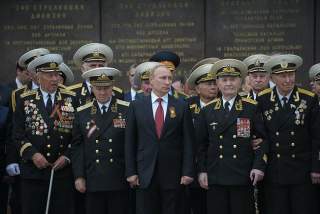Putinology 101: The Kremlin's Real Strategic Goal in Ukraine
It's not what you think.
In the provinces, the social fabric has shown signs of wear along ethnic, religious, and economic lines. In August 2013, the governor of Krasnodar Region, Aleksandr Tkachyov, caused a stir when he allegedly intended to create a "Cossack police" force to "take care of" the problem of illegal immigration—code for the presence of North Caucasus ethnic groups trying to escape the officially reported 13.1 percent unemployment rate in the North Caucasus Federal Province as of 2012. And in the same month, the governor of Stavropol' Region, Valerii Zerenkov, resigned—willingly or unwillingly—in connection with a minor confessional scandal, after the Supreme Court ruled in favor of a regional law forbidding students to wear hijabs as part of their school uniforms. The October 2013 Biryulevo riots in Moscow dramatically illustrated that these tensions were present even in the capital.
Weakness has plagued the Putin system since before his return to the presidency. The social media-driven protests from December 2011 to May 2012 reflect a profound generational and cultural abyss between the government and the upwardly mobile created by the social and economic reforms over which Putin presided and can legitimately claim success. According to the Levada Center, a Russian polling agency, Putin's approval rating spiked 11 percent, from 69 percent in February to 82 percent in April. With the exception of governors, approval ratings across the government have improved. This sort of popularity was short lived after the Georgian war, and it is not clear whether the rise in approval ratings reflects Russia's citizens' support for Putin's governing system or delight in dressing down NATO.
The evidence of Russian online news and social media suggests that the Kremlin has only tenuous control over public opinion in Russia's urban centers. Shortly after the incursion into Ukraine, Evgenii Gontmakher, a Russian economist and pundit, expressed concern that the creation of a "mobilizational economy" could stunt the country's social and economic development. Users of Russian social media have criticized the Kremlin's economic slogans in more colorful terms. According to an April 28 Kommersant report, for example, Putin announced that regional cuisines—Ossetian and Tatar meat pies, for example—could be produced commercially on a scale to compete with McDonald's. Some 100 Facebook readers nearly unanimously ridiculed the idea as absurd political ruse.
Social media from eastern Ukraine and southwestern Russia suggests a more serious security threat for the region. Users of an online forum for residents of Rostov-on-Don, a city located near Crimea, voice a bewildering array of attitudes that testify to the oversimplification of looking at local populations in terms of pro-Kyiv and pro-Moscow activists. Even more troubling is the news that Igor Strelkov infiltrated eastern Ukraine from Crimea and has orchestrated the violent resistance to the new Kyiv government from Slovyansk. How much direct control can Moscow have over a man who, if his forum posts are genuine, derided the USSR, the Kremlin and its staff—and called himself a monarchist. His vision of an ethnically homogenous "historical Russia" has little in common with any of the Kremlin's statist policies. Evidence from social media suggests he is one example of a widespread subculture of ex-military reenactors. If Moscow and other European powers have sown the wind by interfering in the Black Sea basin, ultimately, the locals will be left to reap the whirlwind.
The Only Good Solution Now Is Federalism
Having slowed down the political changes in Kyiv and shown recklessly, but unambiguously, the divisions in Ukrainian politics and society, Putin is unlikely to move troops any further into eastern Ukraine. That is unless Ukraine's unfortunately provocative "antiterrorism" campaign in the east spirals out of control. Unfortunately, Kyiv is amplifying as many disparate voices in support of its policies as Moscow has since before the invasion. As Anatol Lieven has recently noted, Putin has already made a federal political solution to the crisis of political authority in Ukraine the only viable solution.
Whatever the origins of the crisis in Ukraine, it is in the interests of North America, Europe, Russia and Ukraine to ensure this solution can be codified by the May 25 presidential elections. Otherwise, the echo chamber of social media threatens to bring the political disorder of the so-called Arab Spring onto the European continent. On May 16, the leaders of Jaish al-Muhajireen wal-Ansar (JAMWA), a Caucasian fighting group in Syria, called for Muslims to defend the Muslim Tatar minority in Crimea. Unfortunately, Putin appears to be oblivious to this threat given his recent condescending treatment of the new representative of the Crimean Tatar community, Lentul Bezzaziev, who has risen on the back of Mustafa Dzhemilev, since the latter has been barred from reentering Crimea. For better or worse, stability and security in Europe, the Middle East and Central Asia run through Moscow.
Sean Gillen is an analyst with a defense contractor in Tampa, Florida. In 2012, he earned a PhD in Russian history at the University of Wisconsin-Madison with a dissertation on liberal and conservative discussions of the political order in the context of war and terrorism in late-nineteenth-century Russia.
Image: Kremlin photo

